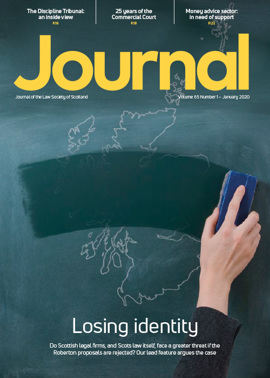Can set-off survive discharge?
In Dooneen Ltd v Mond [2018] UKSC 54 the Supreme Court held that where a protected trust deed had run its course and a final distribution to creditors made, it was not open to the trustee to reopen the trust deed in order to pursue a PPI claim for the benefit of the creditors. The claim was held to vest in the debtor, and creditors under the trust deed could obtain no benefit from it. This was described by the court as “scarcely a satisfactory outcome”.
RBS v Donnelly
Dooneen dealt with the question of whether a trust deed could be reopened by the trustee. However, the recent judgment in Royal Bank of Scotland plc v Donnelly [2019] CSIH 56 (21 November 2019) looked at a different, though related question, namely can a creditor, whose debt has not been repaid in full, claim a right of set-off in relation to a claim extant at the time of the trust deed, but which was not pursued at that time?
The background is strikingly similar to Dooneen. A debtor entered a trust deed for creditors which achieved protected status. The bank’s debt consisted of a loan over which a PPI policy had been sold. The existence of a claim for the mis-selling of the PPI policy was not known about at the time of the trust deed, and so a final distribution to creditors was made amounting to around 22p in the pound. Following her discharge, the debtor made a claim in relation to the PPI. Redress was agreed by the bank. The bank paid part of that redress and sought to claim a right of set-off in relation to the remainder against the unpaid balance of the debt administered under the trust deed. The debtor sued the bank for payment of the balance.
The issue
Unlike Dooneen, the issue in this case was not related to the powers and duties of the trustee, but rather the right of a creditor to “insolvency set-off”. Does the discharge of the trust deed extinguish the balance of a debt such that it is incapable of being set off against a later claim by the debtor?
The bank argued that insolvency set-off was an equitable remedy intended to avoid manifest injustice. In principle, the position of creditors in an insolvency in Scotland is determined at the date of the insolvency. That is the date at which creditors’ claims are fixed. As a result, the bank argued that set-off must be deemed to have taken effect from that date and its claim ought to be treated as an assertion of any right of set-off available. It was argued that this was the case, notwithstanding the fact that the insolvency process came to an end without such a right having actually been asserted as it was not known about.
It was also contended that discharge from the trust deed following final distribution did not have the effect of extinguishing the debt in the same way as it might be extinguished by prescription. This was demonstrated by the fact that (for example) a co-obligant or guarantor for the debt was not discharged by reason of the insolvency process coming to an end.
The bank’s position was not upheld by the court. Noting that the bank required to show that the debt existed at the time the plea of set-off was put forward, the court held that the bank was unable to do so. The effect of a final distribution by the trustee was that the trust deed terminated. Termination has the effect of discharging the debtor from all debts due to creditors acceding to the trust deed. The discharge of the debt, prior to set-off being asserted, meant that set-off could not be sustained. The effect of “discharge” is to extinguish the debt due by the debtor to the creditor. There was no longer any debt against which to set off the claim against the bank.
Comment
As with Dooneen, it may be considered that this represents an unsatisfactory result. A creditor has accepted a significant discount on the sums due to it without the benefit of setting off any claims against it, simply because the claim in question was not known about at the time. The key appears to be whether “discharge” means that a claim is extinguished, or whether it merely means that it exists in law, but cannot be pursued.
The Inner House has firmly held that the former interpretation is the correct one.







